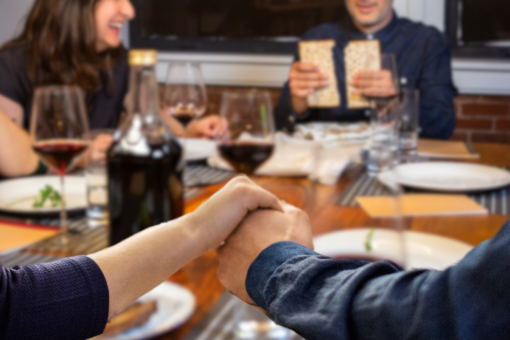Earlier this month, The Forward ran an article of mine called “White Jews: Stop Calling Yourselves White-Passing.” The piece was partly inspired by a racial justice training, and partly inspired by the angry comments my friends and I received for using the phrase “white Jewish people” when talking about intra-community racism for Alma’s Jews of Color Roundtable Discussion.
For context, there is a prevailing view in many Jewish spaces that proposes that no Jew can ever be called white, and that an appropriate term for Jewish people who both appear or move in American society as white is “white-passing.” Essentially, my argument was that “white-passing” is a specific term with a weighty history for people of African descent and as a black person with white-passing family, it chafes to hear it used incorrectly.
When the article dropped, the racist whiplash that I and other black Jews received was almost instantaneous. My words and arguments were deeply misconstrued by other writers at The Forward, we were threatened with doxxing, my friends and I were called racist slurs, and we’ve even had to contend with legitimate threats to our safety. Some of it was just ludicrous, like when I was accused of pretending to be black and being part of an IfNotNow conspiracy to undermine the State of Israel. But it still hurt.
Even with all the bullshit that I faced, I am glad it happened. It was a formative experience for me — one that showed me the kind of writer I need to be, and the ways that I must be intentional about creating Jewish spaces for myself that meet my needs. And that no longer includes Jewbook — a collection of hundreds of private Facebook groups meant for Jewish people to convene and engage with one another.
This may surprise those who read my previous article about Jewbook, where I praised the benefits that it offered to marginalized Jewish groups — including black Jews. But in the wake of all this nonsense, I and many black Jews who were involved in Jewish online spaces felt even more marginalized. We felt that our opinions weren’t respected, we felt dehumanized, and we felt unsafe. Coming to the realization that Jewbook had become an unbearably racist and toxic space was necessary.
But I am still reeling from the shock.
No doubt, Jewbook is still at the center of one of the greatest love stories I’ve seen — just not in the way that I expected. I’ve made some beautiful, lasting friendships that have withstood all this drama. I’m endlessly grateful for that, and grateful that they can exist outside of the spaces where they were formed.
But I no longer believe that Jewbook is a safe space for Jews of Color, especially black Jews. And I’m not the only one who feels this way. My dear friend and fellow black Jewbooker Helena Thompson-Cohen, who experienced a lot of harassment herself, told me that she would come across offensive posts by her friends and think, “Oh wow, that’s how you really feel about black people… that’s what you really thought of me.”
For Genevieve Kahn*, a black sociologist who has been involved in online Jewish spaces for 15 years, the events of last week were not a surprise, but an inevitability. “This was an issue when there were Yahoo groups. This is not a new problem. It’s been a perennial problem in Jewish web spaces,” Kahn told me.
It may be easy to interpret this as an internet problem, not a problem within the Jewish community. But that would be wrong. While it is obviously true that online spaces make it easier for people to be more aggressive, I believe that the racism and anti-blackness within the overall Jewish community cannot be dismissed.
As I pointed out in my previous article, because of its accessibility, Jewbook operates as a major arm of the Jewish community. In many ways, it feels like a microcosm of American Jewish life. Racism within that space cannot be dealt with in isolation from larger community issues. For instance, Helena and I shared mutual friends with many of the people who harassed us; they weren’t random trolls. Jewbook has always been a place where Jewish people with “unconventional” backgrounds could find a place of belonging — it was our own little island of misfit toys, and a real community that just happened to be online.
Now, other black Jews and myself are trying to figure out what Jewish community means to us. We know that it is necessary to create spaces where Jews of African descent are centered and celebrated. But what does that look like?
Kahn believes that it’s a mistake for black Jews to invest their energy in trying to be accepted and protected by the larger Jewish community — something she feels won’t happen for at least another 20 years. Thompson-Cohen agrees that online Jewish spaces are inherently unwelcoming for black people, saying that “in Jewish spaces, people want us to be Jewish, and we have to be black somewhere else. People will separate you from your blackness because that’s easier for them, but when you get black then they get uncomfortable.”
And I agree. The dissonance required to exist in Jewish online spaces as an unapologetic black woman is exhausting. The concerns of black Jews are always trivialized and never prioritized. And in such overwhelmingly non-black spaces, respectful debate is impossible because we get drowned out. When you complain of racism, it becomes your fault. You’re told that maybe you misunderstood the intent. Maybe what you’re experiencing is because you didn’t have a “formal” conversion, or that you’re of patrilineal Jewish descent. The worst excuse I heard last week was that since no Jewish person can be white, all racism within the community was actually colorism, not racism. I don’t have time to explain how wrong that is, but please.
When it comes down to it, I don’t want to spend my writing career arguing with racist white people and others who don’t share my interests. It will likely only result in high blood pressure.
I want to help build something. Something that countless of black Jews and other Jews of Color could benefit from, instead of pouring my energy into a community that doesn’t accept me as a whole person.
So, I’m leaving Jewbook, and am wondering what will be in its place. There are already some amazing things happening. After Jewbook began to have conversations about the ways Jews of Color were being treated, a Persian and African-American Jewbooker, Talya Ariel, got to work on creating Colorful Kosher. Colorful Kosher is a monthly dinner and discussion series that explore lesser known Jewish communities of color through discussing the history, culture, and cuisine of each community.
When I asked Talya why this project was so important, she told me that she believed it was necessary to “change the narrative that there are only a couple of ways to be Jewish or that there is a Jewish ‘look’ that many Jews and in particular, Jews of color, fall outside of. I believe that we can knit our community together through education, open dialogue and, of course, food so that no Jew continues to feel like an outsider amongst family.”
I’m so happy that Talya is creating this space to educate members of our community, but I worry that constantly having to be the educator is exhausting for many black Jews. For Kahn, spaces for black Jewish people that are focused on education must be heavily outweighed by spaces that focus on community, or else she believes failure is a certainty. “You have to create a somewhat separate space that nurtures and supports Jews of Color,” she told me. “Too often, Jews of Color waste time trying to explain things to the larger community, at the expense of younger Jews of Color who leave the community because the racism is never-ending.”
So, what would investing our energy into creating new structures look like? For Kahn, it means alternative High Holidays services, where black Jews can socialize without experiencing invasive questions and being treated as outsiders.
For Thompson-Cohen, that could mean creating an online space — much like Jewbook — where black Jews can make connections all over the country. Connections that will ensure they always have a place at Shabbat dinner, and that there is someone there who understands what they’re going through.
For me, creating safe spaces for black Jews means embracing who we are — not trying to assimilate into mainstream American Jewish culture. We’re different people, who come from wildly different backgrounds, even within our own small community. We need spaces where black Jews don’t have to be ashamed of who we are, where we don’t have to subsume our blackness to be considered a “real Jew.” We need spaces where getting a conversion doesn’t have to feel traumatic, where services can embrace our own traditions, like gospel or African music. We need a space where crypto-Jewry, patrilineal descent, and conversion are not taboo but something quite normal. We need a space where we can breathe.
I don’t know how to create that space just yet. I don’t even know what my own role will be. I’m still figuring all that out. But what I do know is that it is needed.
*names have been changed
Header Image via Rebecca Hendin on giphy.



